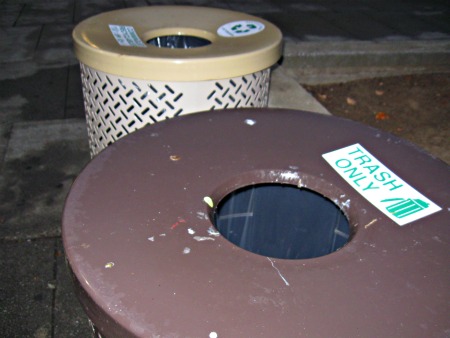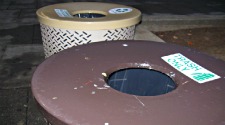Because students do not care to glance at one of the numerous signs around school, they are putting things into the trash that can be recycled.

From the day that they were installed, the brown and beige bins had big stickers on them that said, “TRASH ONLY” or “RECYCLING.” But recently, ASB officers had to remind students how to use the bins: containers with food in them and used tissues cannot be recycled. These are lessons we learned in elementary school — preschool, even.
The resulting waste had become so much that we were forced to address the problem. When the bins were first installed, the administration saw no need for a formal recycling program. They likely reasoned that students were smart enough to know that tissues did not go into the recycling bins. Now, MVHS has realized that it cannot go any longer without a recycling program. National Honors Society stepped up to the task of separating out the trash and recyclable items on Nov. 12. On Wednesdays and Saturdays for the rest of the school year, they will recycle the contents from the bins that were previously trashed because MVHS did not have enough people to process the contents of every one of the 21 bins, every night.
Why does this matter? Because it costs the school to throw away trash. And with this much trash building up, it’s strange that students wonder why MVHS is lacking funds.
The most obvious solution to this would be for students to educate themselves on what can be trashed as opposed to what can be recycled. However, this did not work in the past. Community Leadership has already asked the student body a second time.
There are a couple of measures that might improve this situation.
One: We should hang the same signs that are up in classrooms in front of the trash and recycling bins, where they might be of more use to students wondering where their garbage goes. To prevent them from flying away or getting trashed, we could put them in a clear case, much like those of the unused bulletin boards around school.
Two: Whenever we raise funds from good recycling habits, we can let students know of the positive results of recycling. Perhaps we might even set goals, such as a rally or a lunchtime activity, that are funded by the money saved by recycling.
The simple solutions proposed above will go a long way in saving time and money. This positive reinforcement will motivate students to save money in simple ways while reaping the greatest benefits. As for the new recycling program? We still do not need it. If we recycle, NHS members will be able to devote their time to more important pursuits — that is, helping those in need rather than those that can help themselves.
A little thought can go a long way towards improving our campus. Now it is up to students to do it.








